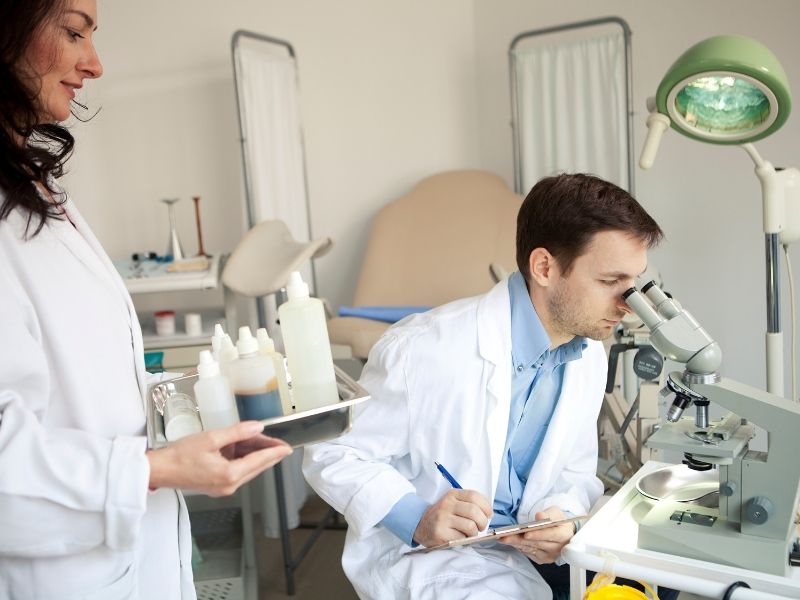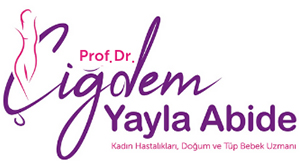In vitro fertilisation is a treatment method used by couples who have tried to have a child for at least one year but have been unable to do so naturally. This method, which is used to have a child, helps reproduction and is carried out by collecting ovaries from the woman and sperm from the man and combining them in a laboratory environment. In vitro fertilisation treatment cannot be performed by anyone who wants, some problems must be present for this treatment. In this article, the stages of IVF treatment are mentioned.
IVF, also known medically as In Vitro Fertilisation (IVF), is a technology that enables couples to have children. With this method, it is possible for women to have a child by fertilising the eggs taken from their ovaries with sperm cells under laboratory conditions and then placing the embryos formed into the uterus.
IVF procedure is used in cases where couples cannot have children naturally, women have ovulation problems, men have sperm quality problems or couples have problems in having children for various medical reasons.
How Long Does IVF Treatment Take?
IVF treatment may vary according to the treatment plan used by the couple and any problems that may occur during the treatment process. Hormone drugs are used to stimulate the ovaries of women. The use of these drugs takes about 10-12 days and during this period, women may need to have regular ultrasound and blood tests. The woman's eggs are collected with the help of a needle and this process takes 15-20 minutes. Sperm samples are then taken from the man, prepared in the laboratory and after 3-5 days the embryos are implanted into the uterus.
What are the Stages of IVF?
IVF treatment is a process consisting of many stages. This process can be challenging and long-lasting. In some patients, a positive response can be obtained as soon as possible, while in some patients this process may take longer than expected.
Firstly, the woman takes hormone medication and more than one egg develops in her ovaries. On the second day of menstruation, hormone therapy is started according to the results of ultrasound and blood hormone results.
After hormonal stimulation for the maturation of the eggs, the eggs are collected. This is usually performed under ultrasound guidance and a needle is used to collect the eggs from the woman's ovaries.
During the collection of the eggs, a sperm sample is taken from the man. This sample is analysed and prepared in the laboratory for sperm quality.
The eggs and the sperm sample are brought together in the laboratory. At this stage, fertilisation takes place and embryos are formed. Healthy embryos developed from fertilised eggs are transferred to the woman's uterus.
About two weeks after the embryo transfer, a pregnancy test is performed. This test determines whether there is a pregnancy or not. The IVF treatment process can vary depending on many factors and the process that each couple goes through is different. The success of the treatment depends on many factors. One of the most important factors is egg quality, depending on the woman's age.
IVF treatment consists of 6 stages. These stages of IVF treatment take an average of 1 month.
Increasing egg production
Before starting IVF treatment, the woman's ovaries are stimulated with hormonal medication to produce more eggs. More egg production will increase the chances of IVF treatment. The treatment is started on the second day of menstruation by performing an ultrasound and checking the hormone values in the blood. The doses of hormone medication are determined according to the patient.
Collection of eggs
The ovaries are collected with a needle under ultrasound guidance. Egg collection takes a maximum of half an hour and the eggs are prepared for fertilisation in the laboratory.
Sperm retrieval
Sperm is required for the fertilisation of the eggs. Sperm samples taken from the man allow the next step to be taken. A sperm sample is taken on the same day as the egg retrieval procedure. If there is no sperm sample in the male semen, this procedure can be performed surgically.


Fertilisation stage
Sperm and eggs are brought together in the laboratory and fertilisation takes place. In IVF, sperm and eggs are placed in a container and fertilisation is expected to occur. In the ICSI method, sperm is injected into the eggs. The ICSI method is usually used when there is a problem with the quality or quantity of sperm.
After fertilisation, the embryos are left to develop in the laboratory for a few days. The best quality embryos are selected.
Embryo transfer
The implantation of the embryos into the mother's uterus is carried out with the help of a thin catheter. It is a simple and painless procedure. During this process, the embryos are expected to attach to the uterus. During this period, the expectant mother should not take any medication, smoke, do heavy work or exercise.
Pregnancy test
A pregnancy test is performed approximately 10 days to 2 weeks after the embryo transfer. In case of a positive result, an ultrasound scan should be performed approximately 10 days later.
In which cases is IVF treatment performed?
IVF treatment is an option for couples who have difficulty in having a child naturally. The conditions listed below are suitable for IVF treatment.
- Ovulation problems in women,
- Problems with sperm count or motility, sperm quality in men,
- The woman's tubes are blocked or damaged,
- The growth of endometrium tissue that causes discomfort outside the uterus, i.e. endometriosis,
- Presence of genetic disorders in parents
- Recurrent miscarriages
- Unexplained infertility
- Low ovarian reserve
These reasons are necessary reasons for IVF treatment. It can be used in combination with other treatment methods for people who want to have a child.
Can Everybody Have IVF?
Not everyone may be suitable for IVF treatment. IVF treatment is determined when people who cannot have children naturally apply to a specialist and after the necessary examinations, the doctor decides whether they are suitable for IVF treatment. IVF treatment is recommended by gynaecologists for suitable candidates and is personalised according to the couples' health history and medical conditions.
Frequently Asked Questions About IVF
Can women over 40 years of age undergo IVF?
The most important factor affecting the success of IVF is the age of the expectant mother. The younger the age, the higher the success. In this case, we can say that IVF success decreases in women over 40 years of age. The reason for this is the division errors of the embryos. Therefore, we recommend genetically diagnosed IVF, which we call NGS, to our patients over the age of 40.
Is IVF 100% successful?
No, it cannot be achieved. There is no 100% success in any centre in any country in the world. Of course, many factors come into play when giving the highest success rate in IVF treatments. Among these factors, the experience of the physician and the technology of the embryology laboratory are very important. In our clinic, we keep our success rate at the highest level.
Is uterine thickness important in embryo transfer?
In frozen or fresh embryo transfer, pregnancy rates increase if the thickness of the uterus is 7 mm or more.
Do tobacco, alcohol and obesity have a negative effect on pregnancy?
Definitely yes. These bad habits can prevent pregnancy from occurring and increase pregnancy complications.
I have fibroids and can I get pregnant without having them removed?
The location and size of your fibroids are very important for conception. If your fibroids are in the uterine lining where the baby will attach and grow, these fibroids should be removed with a small closed method surgery called hysteroscopy. Fibroids that do not cause any complaints and are not suspected of cancer should be followed up. Fibroids will shrink after menopause.







